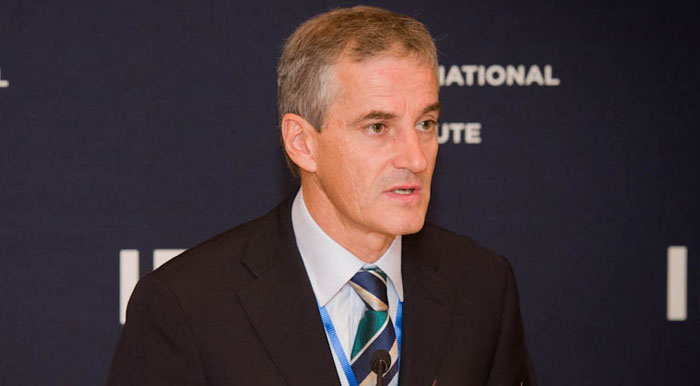
Jonas Gahr Støre, the Foreign Minister of Norway, and chair of the Fourth Annual Trygve Lie Symposium on Fundamental Freedoms at IPI made this reference in opening the discussion September 21st at this year’s symposium, which focused on The Role of Social Media in Promoting Democratization and Human Rights: Prospects and Challenges.
He said that social media represented “an important challenge for authoritarian regimes and opportunity for people who are uprising. But I think the point here which I would like to make is that neither Facebook nor Twitter brought down Mubarak or Ben Ali. It was people who did it, people who took to the streets, unarmed, apart from the conviction that they had their moment of opportunity.”
His reference was to Hosni Mubarak and Zine El Abidine Ben Ali, the leaders of Egypt and Tunisia who were both forced from office earlier this year by popular protests.
Mr. Støre said that social media were “tools and multipliers”, offering a more effective way of bringing out information, but he warned that “this efficiency, of course, triggers repressive regimes, and they have not been slow to respond.”
In that connection, he noted that some sixty countries “are listed as exercising strong forms of Internet censorship. They filter, they infiltrate, they manipulate, and they harass. So there is another technology branch growing up with those opportunities, and especially for human rights defenders, this insecurity of digitally-stored or communicated information via social media can prove to be a great vulnerability, a dilemma.”
Carl Bildt, the Foreign Minister of Sweden and an avid Twitter user himself, echoed these thoughts about the power and vulnerability of social media and said that his country had put Internet freedom and Internet security “high on our Foreign Policy agenda.”
Nora Younis, human rights activist, journalist and blogger in Egypt, said that social networks “had this major role in what happened in Egypt, but I don’t want to overplay it. The revolution did not happen by coincidence or due to some hashtag or some Facebook group. It’s been a lot of work done on the ground by generations.”
Maria Otero, US Under Secretary of State for Democracy and Global Affairs, said that Internet freedom was also a priority for the United States. “Secretary Clinton has really coined this phrase, ‘freedom to connect’, because really the Internet freedom is grounded in the Universal Declaration of Human Rights,” she said.
Wissam Tarif, Arab World Campaigner for Avaaz (Global Movement), talked about social media’s importance in Syria where a popular resistance is testing the regime of Bashar al-Assad, and the government is characterizing the protests as a foreign-led conspiracy. “I have been there three times since the uprising, in different areas in Syria, and the only thing that stands behind this uprising is the Syrian people’s will, because they want to be free, and they want to live in democracy. They used Facebook to organize themselves and to spread the word. They used Twitter.”
Claire Diaz Ortiz, Manager for Social Innovation and Executive Leadership at Twitter, recalled that the author Malcolm Gladwell had written an article last year stating that revolutions wouldn’t be tweeted. “And at the time,” she said, “it was this big question, ‘Is he right?’ you know, ‘Can the revolution not be tweeted, really?’”
“And now a year later, there’s no question. We all know people are tweeting revolutions.”
Watch video of event:







